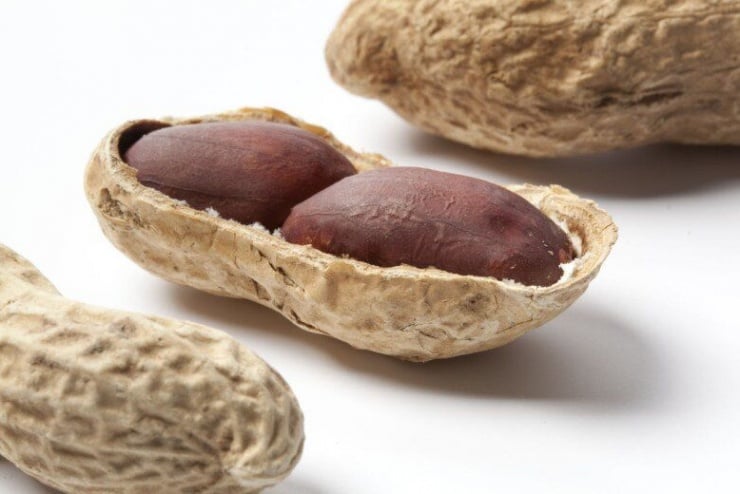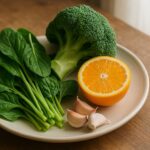Hair loss is a common issue with various causes, and one of the prevalent conditions is oily scalp-induced hair loss. When the scalp produces excess sebum, it can clog pores, fostering bacterial growth and inflammation. This disrupts the hair growth cycle, weakening the hair and making it more prone to shedding. Typically, this condition starts in the 20s and may be accompanied by symptoms such as dandruff, oily scalp, and itching. Without proper management, hair thinning on the crown and temples can progress over time.

Saturated fat in peanuts can also contribute to inflammation, affecting the hair follicle environment.
Apart from hormonal factors and hair care routines, diet significantly influences scalp and hair health. Overindulging in certain foods can increase sebum production or cause scalp inflammation, making hair more prone to shedding. Here are three types of food you may consider reducing to maintain robust hair health:
1. Peanuts
Peanuts are a good source of protein, vitamins, and minerals beneficial to the body. However, for individuals with oily skin types or oily scalps, excessive peanut consumption can increase sebum production, leading to pore blockage. Additionally, the saturated fat in peanuts can contribute to inflammation, impacting the hair follicle environment. This may result in an oily, irritable scalp and increased hair loss. If you notice your hair tending to get greasy quickly or shedding more, try reducing your peanut intake to observe any improvements.
2. Chocolate
Chocolate is a beloved treat, but excessive consumption can impact hair health. Most chocolates on the market are laden with sugar and fat, which spike insulin levels and stimulate sebum production. When the scalp produces excess oil, hair follicles can become clogged and inflamed, increasing the likelihood of hair loss.

Chocolate is a beloved treat, but excessive consumption can impact hair health.
Moreover, excessive sugar intake accelerates the aging process, affecting the overall health of the skin and hair. If you enjoy chocolate, opt for dark chocolate with lower sugar content to mitigate these adverse effects.
3. Chili Peppers
Chili peppers do not directly cause hair loss and can offer some benefits for metabolism. However, when consumed with oily or spicy dishes, they can stimulate the scalp to produce more oil. Some individuals are also sensitive to spicy foods, experiencing skin redness or inflammation, which can impact scalp health. To protect your hair, you don’t need to eliminate chili peppers entirely but rather control your consumption and avoid excessive spiciness.
Tips for Healthy Hair Care
In addition to dietary adjustments, adopting healthy habits can promote stronger hair. Here are some valuable suggestions:
Maintain a clean scalp: Wash your hair properly to remove excess oil and dirt, preventing follicle blockage.
Manage stress: Stress can disrupt hormones, affecting the hair growth cycle.
Nutrition supplementation: Include foods rich in protein, iron, zinc, and vitamins A, C, D, and E to nourish your hair from within.
Stay hydrated: Drinking enough water maintains scalp moisture and prevents dry, brittle hair prone to breakage.
Minimize chemical and heat exposure: Excessive hair styling, such as curling, straightening, and dyeing, can weaken hair, making it more susceptible to damage and shedding.
“Protein-rich Meals: H’Hen Niê’s Husband’s Special Recipes for Her Healthy Lifestyle”
H’Hen Niê and her husband share a passion for fitness and healthy eating. Their meals typically consist of a high protein ratio, designed to support muscle recovery, growth, and tone. This power couple fuels their active lifestyle with a nutritious diet, ensuring their bodies are nourished and energized.
The Liver: Your Silent Maestro, Yet Vulnerable: How to Nurture It for Optimal Daily Health?
The liver is a silent yet vital organ for overall health. In today’s fast-paced world of fast food, sedentary lifestyles, and medication overuse, the liver silently struggles to keep up with the daily overload. But there’s good news – with just a few simple lifestyle changes, you can give your liver the support it needs to thrive once more.
Cancer Cells ‘Go Crazy’ for These 3 Flavors: Unknowingly, You’re Feeding Them Daily.
The tantalizing sweetness of sugar, the indulgent richness of fatty oils, and the savory punch of salt – these three familiar flavors that enhance our daily meals are, ironically, the very ingredients that fuel cancer cell growth. This stark reality serves as a wake-up call, revealing an unsettling truth: the more we indulge our taste buds, the higher the risk of inviting disease becomes.





































